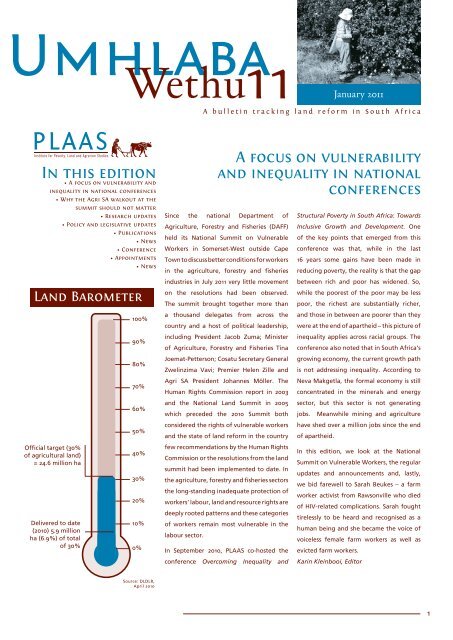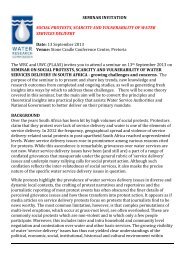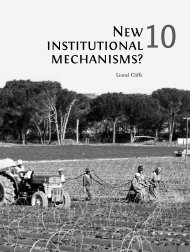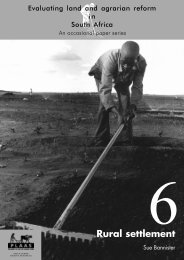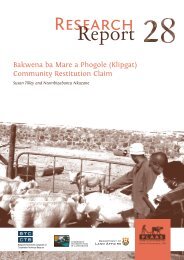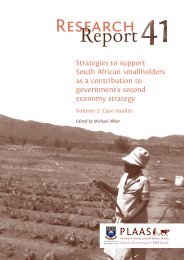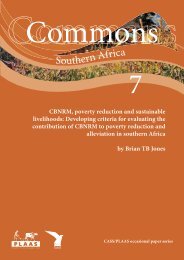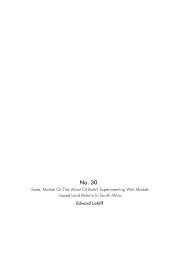Create successful ePaper yourself
Turn your PDF publications into a flip-book with our unique Google optimized e-Paper software.
UmhlabaWethu11January 2011A bulletin tracking land reform in South Africa<strong>PLAAS</strong>Institute for Poverty, Land and Agrarian StudiesIn this edition• A focus on vulnerability andinequality in national conferences• Why the Agri SA walkout at thesummit should not matter• Research updates• Policy and legislative updates• Publications• News• Conference• Appointments• NewsLand BarometerOfficial target (30%of agricultural land)= 24.6 million ha100%90%80%70%60%50%40%30%20%Delivered to date10%(2010) 5.9 millionha (6.9%) of totalof 30% 0%A focus on vulnerabilityand inequality in nationalconferencesSince the national Department ofAgriculture, Forestry and Fisheries (DAFF)held its National Summit on VulnerableWorkers in Somerset-West outside CapeTown to discuss better conditions for workersin the agriculture, forestry and fisheriesindustries in July 2011 very little movementon the resolutions had been observed.The summit brought together more thana thousand delegates from across thecountry and a host of political leadership,including President Jacob Zuma; Ministerof Agriculture, Forestry and Fisheries TinaJoemat-Petterson; Cosatu Secretary GeneralZwelinzima Vavi; Premier Helen Zille andAgri SA President Johannes Möller. TheHuman Rights Commission report in 2003and the National Land Summit in 2005which preceded the 2010 Summit bothconsidered the rights of vulnerable workersand the state of land reform in the countryfew recommendations by the Human RightsCommission or the resolutions from the landsummit had been implemented to date. Inthe agriculture, forestry and fisheries sectorsthe long-standing inadequate protection ofworkers’ labour, land and resource rights aredeeply rooted patterns and these categoriesof workers remain most vulnerable in thelabour sector.In September 2010, <strong>PLAAS</strong> co-hosted theconference Overcoming Inequality andStructural Poverty in South Africa: TowardsInclusive Growth and Development. Oneof the key points that emerged from thisconference was that, while in the last16 years some gains have been made inreducing poverty, the reality is that the gapbetween rich and poor has widened. So,while the poorest of the poor may be lesspoor, the richest are substantially richer,and those in between are poorer than theywere at the end of apartheid – this picture ofinequality applies across racial groups. Theconference also noted that in South Africa’sgrowing economy, the current growth pathis not addressing inequality. According toNeva Makgetla, the formal economy is stillconcentrated in the minerals and energysector, but this sector is not generatingjobs. Meanwhile mining and agriculturehave shed over a million jobs since the endof apartheid.In this edition, we look at the NationalSummit on Vulnerable Workers, the regularupdates and announcements and, lastly,we bid farewell to Sarah Beukes – a farmworker activist from Rawsonville who diedof HIV-related complications. Sarah foughttirelessly to be heard and recognised as ahuman being and she became the voice ofvoiceless female farm workers as well asevicted farm workers.Karin Kleinbooi, EditorSource: DLDLR,April 2010A bulletin tracking land reform in South Africa January 20111
Why the agri sa walkout at the summit shouldnot matterAgri SA walking out of the VulnerableWorker Summit was disappointing, butnot surprising to those of us who haveengaged them over time. The walkout wasmainly sparked by Agri SA taking offenceat farm workers’ repeated assertions at theSummit that they experience widespreadrights violations, contrary to the staple AgriSA line that farmers are by and large lawabiding,except for a ’few rotten apples‘.Agri SA missed the main point of thediscussion, which is not about whetherindividual farmers are ‘good’ or ‘bad’people, but rather a plea to urgentlytransform a production system that robsmost sector workers of any opportunity todream of or realise their constitutional rightto a life of dignity for themselves and theirchildren.Farm worker organisations have goneto great lengths over the years toprovide evidence (research on evictions,documentaries on pesticide poisoning,protest actions and media opinion piecessuch as these) to support the assertion thatSouth African farm workers in the twentyfirstcentury still live in a system of virtualslavery. But the onus should be on farmersto prove their claims that contradict popularfarm worker experience. Without proof toback the claims, Agri SA still maintains thatall is largely well on South African farms. Ifthis is indeed the case, they should be opento the repeated calls to set up open andtransparent farm worker rights monitoringand evaluation mechanisms, withrepresentation from legitimate farm workerorganisations, rather than the plethora offarmer-puppeteer farm worker structurescurrently mushrooming on farms.Agri SA insists it will deal with any rightsviolations reported to it. However, itrejects out of hand the extensive record ofwide-scale violations covered in the 2003South African Human Rights Commission’sinvestigation into conditions on farms;Agri SA has done nothing further to dealwith these abuses. Even if rights violationsare reported to the organisation, it isnot accountable to anyone. When Leeu-Gamka farmer Piet Botes was found guiltyof raping and murdering 13-year-oldElizabeth Martiens, the daughter of oneof his workers, Agri Western Cape did notmake public whether Botes was a memberor not. Similarly, Agri SA is silent about thespate of road accidents involving unsafetransportation of farm workers on the backof open vehicles, in violation of many trafficlaws. Agri SA has repeatedly resisted callsto make its membership list public so thatso-called ‘bad apples’ can be rooted out. So,how serious can the organisation be?The continuous refrain throughout theSummit was, ‘So what’s new?’ Havingattended the 2005 Land Summit and the2008 Consultative Conference on Agriculturein Polokwane, many resolutions did indeedsound very familiar. However, despite AgriSA’s walkout, the Summit nonethelessmade some potentially ground-breakingresolutions.In addition to affirming the resolutions ofthe 2005 Land Summit (including abandoningthe willing-buyer, willing-seller approachto land reform), the Summit alsoadopted a decision to establish agriculturalbargaining councils. Farmer unions have alwaysopposed this, without giving any reasonswhy commercial agriculture should beexempt from establishing a labour rightsmechanism – the norm in almost all othersectors. If realised, agricultural bargainingcouncils will be a significant step forward torealising farm worker rights. Currently, unionshave to embark on individual farm-byfarmnegotiations. With more than 40 000farms in South Africa (where workers earnlow minimum wages with correspondinglylow union subscription fees and resultantunder-resourced unions), a centralised agriculturalbargaining council would go a longway towards freeing union officials to undertakethe education and rights defencework so urgently needed by workers.The Summit also adopted a resolution todevelop a sector-wide comprehensive genderequity strategy. Systemic and historicdiscrimination against women workers hasdeepened due to increased casualisationand outsourcing through labour brokers.Even in 2010, a woman’s position on a farmis still largely determined by her relationshipto a male farm worker. Women areseen quite literally an extension of maleworkers and an auxiliary source of labourto be drawn on as needed in high seasons.This restricts women’s ability to engagein off-farm employment, as they must beavailable when the farm needs them.While such feudal labour practices arenot formally written in contracts, certain– mostly higher paying – positions arereserved for men. Their labour on the farmis valued less than that of men and usuallynot accorded high status in the farm workerhierarchy. With her perceived “nimblefingers”, the female worker is restricted tolower-status functions on a farm. Womenare thus discriminated against both in the2 January 2011 A bulletin tracking land reform in South Africa
terms of their employment and the type ofwork they are able to do.Because women’s work is seen as low-status‘unskilled’ labour, in monetary terms it isvalued well below men’s work. Farmersjustify this by claiming that women usuallyperform ‘unskilled’ work on the farm,but even when men and women workalongside each other fulfilling identicalwork functions, women still often earn lessthan their male counterparts.Female farm workers are also at adisadvantage in housing allocation, ashousing contracts have been historically tiedto permanent farm labour contracts, whichhistorically only men can access. So whenmen lose their jobs, the whole family can beleft homeless, and if a male worker dies oris retrenched, the whole family can be outon the streets. While laws introduced since1994 prohibit linking employment contractswith housing, the practice is still common.Since physical and emotional abuse ofwomen by male partners is rife (in partbecause of the legacy of the tot systemand pervasive alcohol dependence), thissystemic discrimination against womenfurther compromises their ability to leaveabusive relationships and underminestheir safety of that of their children. Giventhe known intersection of gender-basedviolence and HIV/AIDS infection rates, thisblatant discrimination against women haslife and death consequences for them andtheir children.So it is significant that DAFF has for the firsttime committed to going beyond slogansand developing a comprehensive strategyon women’s empowerment to combatthe pervasive discrimination against andmarginalisation of women in agriculture.The litmus test of success for the Summitis not participation by 600 hope-filledfarm workers, or addresses from PresidentZuma, Cosatu Secretary General Vavi oreven the disarming Northern Cape charmof Minister Joemat-Pettersson, who held usall in the palm of her hand in her closingaddress, but rather whether it delivers onits promises. Libraries can be filled withsummit resolutions, but the millions spenton delegates from across the country willcome to naught if the lofty goals are notimplemented.It is unfortunate that Agri SA walked outon an important opportunity to help shapeagricultural transformation, but we hopegovernment finally realises the truth thatwhite farmers have little commitment todoing right by those who built their wealth– the evidence is all around us. These farmers– prime beneficiaries of apartheid throughdirect subsidies, protectionist measures anda guaranteed steady cheap labour supplydue to influx controls and poor labour laws– still don’t grasp the magnanimity of farmworkers who continue to carry the industrydespite having nothing to show for over300 years of exploitation. Instead of againbending over backwards to accommodatethe whims and tantrums of commercialagriculture, let’s proceed in the hopefulspirit of the Summit.Fatima Shabodien, Women on Farms Project(WFP)Research updates’Threats Towards Attaining Food Securityand Food Sovereignty in the Eastern CapeProvince’Masifunde, Zingisa and the Trust forCommunity Outreach and Education(TCOE) will be launching their new study,’Threats Towards Attaining Food Securityand Food Sovereignty in the Eastern Cape(EC) Province’, at Rhodes University towardsthe end of May 2011. The study investigatesprojects initiated under: a) the Massive FoodProduction Programme (MFPP) funded bythe Eastern Cape Department of Agricultureand Rural Development (ECDoA), whichadopted a ‘green revolution’ strategy topromote genetically modified maize andsoya production; and b) private sectorinitiatedcash crop production projects.Research in four villages in communal areasin the Amathole District Municipality showsthat these projects do not serve the interestsof small-scale black farmers or promote foodsecurity in the region. Rather, they promotethe interests of agri-business while usingsmall-scale farmers as a testing ground forthe ‘green revolution’ in South Africa. Theprojects rely on intensive use of expensivechemical inputs, with potentially devastatingeffects on the health, environment andnatural resources (such as water) of localpopulations. These populations are alsoused as cheap labour and integrated intoformal value chains and markets underhighly exploitative conditions that extracttheir surplus, while leaving them to assumeall the risks of production. They use theirbest (consolidated) lands and scarce raindependentwater resources under collectivefinancial and production contracts that lacktransparency and accountability.Most projects in these villages have failedto fulfil their promise to increase foodsecurity, create jobs, alleviate poverty andenable small-scale black farmers to become‘successful commercial producers’. Failurehas translated into indebtedness linked to:• production failure due to lack ofwater and late delivery of inputs andservices;A bulletin tracking land reform in South Africa January 20113
• where production occurred, farmershad no storage facilities and haddifficulty accessing markets;• crops sold are perceived as beingseverely underpaid (since productionwas insufficient to repay loans) orpayment never materialised; and• where additional income was derivedfrom the projects, individual incomeswere negligible.For most farmers’ households, more thanhalf of household income still comesfrom state welfare grants, even for thosewho participated in the so-called MFPP‘success’ story – the Peelton maize (Majali).Furthermore, the only jobs created by theseprojects were short term and casual, andwere created by the farmers themselvesduring land clearance and harvesting.It is worrying that for most farmers theseprojects made ‘no difference’ to previouslevels of household hunger and the amountand variety of food produced in someareas could in fact be declining as a resultof dedicating more land and time to MFPPand cash crop production. Recent changesto the MFPP incorporate the productionof vegetables and livestock, a tacitacknowledgement of past MFPP failures.Although the changes should be welcome,livestock production on a meaningful scalein the communal areas is not viable underthe prevailing conditions of overcrowdingand environmental degradation (Mayende2010).The agricultural programmes promotedin communal areas are being used assubstitutes for land and agrarian reformin the province. The ANC’s PolokwaneConference (2007) resolutions indicated apolicy shift towards integrating land reforminto a broader strategy of rural developmentand pronounced that part- and full-timeagriculture was an opportunity to combatpoverty and build sustainable livelihoodsin communal areas. However, we insist it isnot viable to build sustainable and decentlivelihoods in communal areas under currentconditions, and livelihoods for some cannotbe substitutes for agrarian transformationand rural development, which require: a)access to land outside communal areas totransform the dominant social and propertyrelations; b) changes in agricultural policy; c)water reform and providing infrastructure;and d) marketing and financial support fromthe state to build on people’s own initiativesthrough incorporating new technologies inagro-ecological farming.For more information contact Masifunde at046 6362017. Reference: Mayende G 2010.Rural Development under a ‘developmentalstate’: Analyzing the policy shift on agrariantransformation in South Africa in ‘TheZuma administration: critical challenges (KKondlo and M Maserumule – eds). HSRC.Cape Town.Paula Cardoso , TCOEPolicy and legislative updatesLand Tenure Security BillIn December 2010 Cabinet approved theLand Tenure Security Bill and a draft bill waspublished in the Government Gazette onthe 24th of December 2010. The Departmentallowed 6 weeks for commentary whichcreated a public outcry for an extendedperiod which was subsequently granted.The Bill stands to repeal the Extension ofSecurity of Tenure Act 67, 1997 (ESTA) andthe Land Reform (Labour Tenants) Act 3of 1996 (LTA). The Bill aims to secure landrights for farm dwellers.The new Bill proposes:• to promote and protect the relativerights of persons working on farms,persons residing on farms and farmowners;• to enhance the security of tenure ofpersons residing on farms;• to create conditions conducive topeaceful and harmonious relationshipson farms and in farming communities;and• to sustain production discipline on landin the interest of food security.• This was announced in a recent cabinetstatement.This Bill promotes the establishment ofagri-villages (Chapter 6-7) and proposesamongst others ‘where the Ministeracquires or expropriates land, a portion ofland or a right in land under this Act’ theamount of compensation and the time andmanner of payment shall be determinedeither by agreement or as regulated by theExpropriation Act 1975 (Act No. 63 of 1975)and in accordance with section 25(3) of theConstitution (Sec 28 (2). Comments on theBill will end on Thursday, 24th of February2011.Land Use Management BillThe Land Use Management Bill movedto establish a single, national legislativeand institutional framework for spatialplanning and land use management withthe repeal of a range of existing planninglaws and ordinances formulated and passedbefore 1994, including the DevelopmentFacilitation Act. The Land Use ManagementBill was set to be reintroduced in Parliamentin 2010. However, no new submissions havebeen introduced to Parliament yet.4 January 2011 A bulletin tracking land reform in South Africa
PublicationsMunicipal Commonage –How to Access and Use It!The Legal Resources Centre and the TCOEreleased a booklet discussing:• the history of municipal commonagesin South Africa;• opportunities municipal commonagescan create for land reform and ruraldevelopment;• the rights of poor town residents(who were excluded from municipalcommonages under apartheid) toprevent municipalities from sellingmunicipal commonages and to accessthem to supplement livelihoods;• the relevant municipal laws and thenational legal and policy frameworkthat permit the DRDLR to grant fundingto municipalities to buy land to extendexisting commonages or establish newones;• how to establish infrastructure, planand implement projects and do audits.The main aim of the booklet is to help‘previously disadvantaged’ town residentsto mobilise to access municipal commonagesfor agricultural production.This publication is available from LRC http://www.lrc.org.za/booklets/1243-municipalcommonageand TCOE offices.The Land Tenure LawAshraf Mohamad of Cheadle, Thomson& Haysom Inc. under the auspices of theDepartment of Rural Development’sLegal Services Project of the Land RightsManagement Facility. Juta.This book covers complex legal issuesrelating to land tenure law, includingthe Labour Tenants Act 3 of 1996, LabourTenancy Arbitration Rules, Extension ofSecurity of Tenure Act 62 of 1997, andthe Regulations under the ESTA and thePrevention of Illegal Eviction From andUnlawful Occupation of Land Act 19 of1998. The book explains key definitions inthe law and provides practical guidelineson land rights disputes. It also explainsrelevant case law in accessible languageand sets out the nature and scope of legalprotection available to land occupiers andlabour tenants, with a section on access tothe courts, including the Land Claims Court.The book also includes a bibliography oflocal and international publications on landtenure.Working Paper 11. A Fieldnot Quite Her Own –Single Women’s Access toLand in Communal Areasof Zimbabwe.Gaynor ParadzaDominant arguments about women’s landaccess stress the vulnerability of singlewomen’s land rights in customary tenure areas.The vulnerability is based on long-heldassumptions about customary tenure landgovernance, land use and gender relations.The paper – the first in a series looking atsecured access to land for poor women insouthern Africa – contributes to the debateon customary area land access, landlessnessand understanding customary tenure evolution.Although single women have increasinglyinsecure tenure on customary tenurelands, spaces do exist in those systems forsingle women to negotiate access to land.Such spaces remain hidden in customarytenure analysis that focuses on the primary–secondary rights dichotomy and the use ofland as an agricultural asset. Drawing oncase studies of 22 women in a customarytenure area in Zimbabwe, the paper showsthat although resource governance systemsin customary tenure areas are male-biased,more diverse access opportunities exist thanpreviously thought and single women havesome room to manoeuvre. Visit http://www.landcoalition.org/sites/default/files/publication/954/WLR_11_Gaynor_A_field.pdfWorking Paper 12.Differentiation ofWomen’s Land TenureSecurity in SouthernAfrica.Gaynor ParadzaThe comparison of women’s land access ispredominantly measured against that ofmen, and this has been the basis for formulatingpolicy aimed at increasing women’sland tenure security. However, this dichotomyreduces women to a homogeneousgroup that experiences tenure security inan identical manner, so masking severaldifferences which exist among women. Afocus on the differences among women allowsfor significant insight to emerge intohow women experience tenure and accessdifferently, how various policies impact ondifferent women, and the specific waysthese differences could be used to informpolicy formulation and evaluation. Focusingon differentiation among women alsoillustrates other important factors shapingwomen’s access to land – factors that aregenerally overlooked when research focuseson differences between men and women.This paper highlights how differentiationis useful to explain women’s differencesin land access and how policy aimed at ensuringwomen’s tenure security could bemore effective. Visit http://www.landcoalition.org/sites/default/files/publication/955/WLR_12_Gaynor_Differentiation.pdf for afull copy of the working paper.International land Coalition (ILC)A bulletin tracking land reform in South Africa January 20115
NewsLeading internationalscholars of agrarianchange visit <strong>PLAAS</strong>Four leading international scholars ofagrarian change will visit the Western Capein the first quarter of 2011. Henry Bernstein,James Ferguson, Bridget O ‘Laughlin andPauline Peters have undertaken research onrural social dynamics, processes of agrarianchange and related themes over many yearsin different parts of Africa. They are widelyrecognized for the powerful contributionsthey have made to scholarship.They were being co-hosted by the StellenboschInstitute for Advanced Study (STIAS).Discussions and debates between Februaryand April 2011 between the visitors and localscholars will focus on a number of interrelatedthemes, including: the characterand dynamics of rural poverty in Africa;processes of social change that are recomposingrural households and communities;customary law and women’s land rights;the evolution of agrarian structure in theSouthern African region; and the wider implicationsof such processes for policies ofland and agrarian reform.Together with a number of other localand international researchers, they willparticipate in a <strong>PLAAS</strong>/STIAS colloquium on“land reform, agrarian change and ruralpoverty in the Southern African region”on 8-9th March. From 15-16th March theywill contribute to a workshop on “gender,land rights and contested boundaries incustomary law contexts” being hosted bythe Law, Race and Gender Unit at UCT.They will also contribute to a seminar on“trajectories of global capitalism and theimplications for Southern Africa”, hostedby the Department of Sociology and SocialAnthropology at Stellenbosch University on22nd March.Bridget O’ Laughlin was Reader in Populationand Development at the Institute of SocialStudies, The Hague, until her recentretirement. Her PhD in Anthropology fromYale University, and undertook researchand teaching at the Universidade EduardoMondlane in Maputo, Mozambique from1979 until 1992, based in the Centro deEstudos Africanos and the Departmentof Economic Policy and Development.Her scholarship focuses on the politics ofgender, culture and class in social policy,and on gender, land, health, migration andagrarian change in Southern Africa. Sheis on the editorial board of Developmentand Change and the international advisoryboard of the Journal of Agrarian Change.Henry Bernstein is Professor Emeritusof Development Studies, at the Schoolof Oriental and African Studies (SOAS),University of London, and AdjunctProfessor in the College of Humanities andDevelopment, China Agricultural University,Beijing. He has taught and researchedat universities in South Africa, Tanzania,Turkey, China, France, the Netherlands,Canada and the USA, as well as the UK. Hisscholarship focuses on comparative politicaleconomy of agrarian change, land reform,social theory and development theory.Between 1985 and 2000 he was co-editor(with TJ Byres) of the Journal of PeasantStudies. From 2000 he was co-founder andco-editor (with TJ Byres) of the Journal ofAgrarian Change, of which he is now aneditor emeritus.Pauline Peters is Faculty Affiliate andSenior Research Fellow of the Centerfor International Development, HarvardUniversity and until recently taught inboth the Harvard Kennedy School ofGovernment and the Department ofAnthropology at Harvard University. She ison the international advisory board of theJournal of Agrarian Change.James Ferguson is a Professor ofAnthropology at Stanford University. Hehas a PhD in Anthropology from HarvardUniversity and has taught at the Universityof California, Irvine, where he alsodirected the Critical Theory Institute. Hisscholarship focuses on political economy,“development”, culture and power,systems of discourse and knowledge, labourmigration, poverty, and the theory andpolitics of ethnography. He serves on theeditorial or international advisory boardsof numerous journals, including CulturalAnthropology and Critical African Studies.Strategy workshop:Re-thinking ruraltransformation in SouthAfrica31 January 2011, Mandela/Rhodes Place inCape TownHosted by Foundation for Human Rightsin collaboration with Institute for Poverty,Land and Agrarian StudiesThe Foundation for Human Rights (FHR)and Institute for Poverty, Land and AgrarianStudies (<strong>PLAAS</strong>) hosted and convened acivil society workshop aimed at strengthenstrategic engagement around rural developmentand land reform in South Africa.The workshop helped developed new thinkingon these complex and contested issues,6 January 2011 A bulletin tracking land reform in South Africa
and contributed to more inclusive, openand participatory policy processes on ruraltransformation in South Africa. It created aspace for in depth content-oriented discussionswhile current policy proposals wereclarified and debated.The workshop took place in the context ofheated and controversial policy debates inthe media alongside a closed and increasinglyopaque policy process with the GreenPaper on Rural Development and AgrarianTransformation which is meant to beinformed by the Comprehensive Rural DevelopmentProgramme, (however it is notclear what the successes of this programmeare and the Green paper continues to bedelayed), the Land Tenure Security Bill thatwas released for public consultation in December2010, The Recapitalization and DevelopmentProgramme which replaces all‘development’ grants for land reform in abid to revive struggling land reform farms,and a host of suggested legislative reformsrecommended by the South African Law ReformCommission.ConferenceInternational ConferenceOn Global Land GrabbingThe phrase ‘global land grab’ has becomea catch-all phrase to describe and analysethe current explosion of (trans) nationalcommercial land transactions. Aroundthe world, various state, corporate andcivil society groups have reacted, albeit indifferent ways. Some see this as a majorthreat to the lives and livelihoods of therural poor worldwide, and so opposessuch commercial land deals. Others seeeconomic opportunity for the rural poor,although they are wary of corruption andnegative consequences, and so calls for theimproving land market governance featureprominently. Between these two extremesfor and against large scale land purchases/sales are a range of intermediate positionsoffered by other groups.<strong>PLAAS</strong> with the Future AgriculturesConsortium (FAC), the Institute ofDevelopment Studies (IDS) at the Universityof Sussex, and the Land Deal Policy Initiative(LDPI) in collaboration with the Journal ofPeasant Studies are hosting an InternationalAcademic Conference on Global LandGrabbing from 6–8 April 2011. Theconference starts off with a plenary, chairedby Ruth Hall and a keynote address will bedelivered by the UN Special Rapporteur onthe Right to Food. Different panel sessionwill be held discussing various aspectsof land grabbing, including: land rights,land title deeds, environmental mattersand ecological perspectives, governance,politics and participation, and the impacton livelihoods of pastoralists. www.futureagricultures.org/landgrab.htmlAppointmentsMr Langa Zita was appointed new Director-General in the DAFF in September 2010.Until his appointment, Mr Zita was SpecialAdvisor to the minister, focusing on policy.Mr Zita also held positions in the NationalAssembly:Dr Gaynor Paradza has joined <strong>PLAAS</strong> as aSenior Researcher. Dr Paradza completedher PhD entitled ‘Single Women, Land andLivelihood Vulnerability in a CommunalArea in Zimbabwe’, in June 2010 atthe Wageningen University in theNetherlands. Previously she was aSenior Researcher at the Centre forPolicy Studies. Her research interests liein gender and land tenure, livelihoodvulnerability, local governance, pro-pooragrarian land reform and grassrootsinnovations to secure women’s access toland in sub-Saharan Africa. Publicationsof Dr Paradza includes:• Paradza G. 2010. Single Women,Land and Livelihood Vulnerabilityin a Communal Area in Zimbabwe.Wageningen Publishers: Wageningen,the Netherlands. http://edepot.wur.nl/139210• Paradza G. 2010. Single Women’sExperiences of Livelihood Conditions,HIV and AIDS in the Rural Areas ofZimbabwe, in Anke Niehof, GabrielRugalema and Stuart Gillespie (eds)Dynamics and Diversity in sub-SaharanAfrica. Earthscan Publications Ltd:London.A bulletin tracking land reform in South Africa January 20117
Our blog, http://anothercountryside.wordpress.com offers a space for democratic debate on policies and other key aspects ofthe politics and economics of land and agrarian change in southern Africa. Please feel free to participate in discussions and letus all imagine another countryside.If you would like to contribute content on topical debates around land and rural transformation, poverty, livelihoods, fisheriesor any of <strong>PLAAS</strong>’s other research areas, please contact our Information and Communication Officer, Rebecca Pointer onrpointer@uwc.ac.za.We have created this space where we – and you – can speak and argue and debate about key issues relating to land andagrarian change in the subcontinent. Let us all imagine another countryside.Like us at http://on.fb.me/plaasuwcFollow us at http://twitter.com/<strong>PLAAS</strong>uwc#<strong>PLAAS</strong> obtained information for Umhlaba Wethu from a wide range of sources, including documents from the Departmentof Rural Development and Land Reform and the Commission on Restitution of Land Rights: http://www.ruraldevelopment.gov.za. Views expressed here do not necessarily reflect the views of <strong>PLAAS</strong>.Umhlaba Wethu is supported by:<strong>PLAAS</strong>Institute for Poverty, Land and Agrarian StudiesSen d su g g e s t i o n s an d co m m e n t so n th i s publication to:Karin Kleinbooi, Institute for Poverty, Land and AgrarianStudies, School of Government, University of the WesternCape, Private Bag X17, Bellville, 7535, South Africa, Tel:+27 21 959 3733, Fax: +27 21 959 3732, E-mail: kkleinbooi@uwc.ac.za or visit our website: www.plaas.org.za8 January 2011 A bulletin tracking land reform in South Africa


